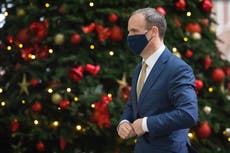Brexit talks go down to the wire after UK and EU step back from no-deal brink, but with no breakthrough
With no new deadline set, negotiations could drag on into festive period, with 31 December the only cut-off
Your support helps us to tell the story
From reproductive rights to climate change to Big Tech, The Independent is on the ground when the story is developing. Whether it's investigating the financials of Elon Musk's pro-Trump PAC or producing our latest documentary, 'The A Word', which shines a light on the American women fighting for reproductive rights, we know how important it is to parse out the facts from the messaging.
At such a critical moment in US history, we need reporters on the ground. Your donation allows us to keep sending journalists to speak to both sides of the story.
The Independent is trusted by Americans across the entire political spectrum. And unlike many other quality news outlets, we choose not to lock Americans out of our reporting and analysis with paywalls. We believe quality journalism should be available to everyone, paid for by those who can afford it.
Your support makes all the difference.The Brexit talks are poised to carry on until Christmas or beyond after the UK and EU stepped back from the brink of settling for a no-deal outcome – but with no breakthrough that takes it off the table.
A deadline of Sunday for an agreement to be in sight – or the negotiations would be over – was ripped up after a 30-minute phone call between Boris Johnson and the European Commission president, amid cautious hints of progress in Brussels.
But the optimism was quickly punctured by the prime minister, who warned a no-deal outcome was still “most likely”, saying: “Let’s get ready for the WTO [World Trade Organisation] option, that’s what I told the cabinet.”
With no new deadline set, there is a real prospect the negotiations will drag on into the festive period, with 31 December – the end of the transition period – the only cut-off.
Mr Johnson refused to say if the EU had given any ground, despite suggestions a threat of so-called “lightning tariffs” if the UK cuts standards in future, gaining an economic advantage, had been diluted.
Dominic Raab suggested the UK would “accept arbitration”, provided it was independent – offering a possible way through, but with the crucial issue of which body would be responsible unknown.
Ireland’s foreign minister, Simon Coveney, urged people to draw confidence from negotiators being “tight-lipped”, saying: “Neither side is breaking confidence and I regard that as a good sign.”
Business groups spoke of their relief that a no-deal outcome had been averted for now, but stressed the damage of the confusion, just 18 days before the UK leaves the single market and customs union.
“The 11th hour has passed and every passing moment of uncertainty makes it harder for businesses to prepare effectively for 1 January,” said Helen Dickinson, chief executive of the British Retail Consortium.
Tony Danker, the CBI director-general, echoed the criticism, demanding: “From IT roll out to border checks, every question that can be answered, must be answered.”
For Labour, Ed Miliband condemned “playing Russian roulette” with jobs, while Ed Davey, the Liberal Democrat leader, said it was “shocking” that trading terms with the EU next month were still a mystery.
The immediate threat of no deal was lifted when Ursula von der Leyen, the commission president, announced in Brussels that yet another deadline had evaporated.
“Despite the exhaustion after almost a year of negotiations, despite the fact that deadlines have been missed over and over, we think it is responsible at this point to go the extra mile,” she said, reading out a joint statement.
But Mr Johnson, speaking later in Downing Street said, said: “As far as I can see, there are some serious and very, very difficult issues that currently separate the UK from the EU.”
The prime minister, who claimed on Friday that a no-deal outcome would be “wonderful”, again talked up “a clarity and a simplicity in that approach that has its own advantages”.
However, official forecasts predict no deal will swipe £40bn from the UK economy next year, putting 300,000 people out of work, with warnings of border chaos and higher food prices.
Mr Raab admitted the UK is poised to lose the ability to share vital security data, saying: “There are certainly instruments that we may not have access to.”
Among the databases the UK could be shut out of are the second-generation Schengen Information System (SIS II), recording suspected terrorists and major criminals, live passenger records and DNA, fingerprint and vehicle registration details.
There is also a growing risk of clashes in the Channel over fish, where the UK is bolstering its defences with four royal navy patrol ships as the EU seeks continued access to its fish-rich waters.
But Arancha Gonzalez Laya, the Spanish foreign minister, dismissed the threat, saying: “I just think this is all for the gallery. I don’t think this is serious, and by the way I don’t think this is needed.”
John Redwood made clear that hardline Brexiteer Tory MPs are watching closely to ensure Mr Johnson does not compromise too far.
“A long complex legal agreement that locks the UK back into many features of the EU that hinder us is not the Christmas present the UK needs,” he warned the prime minister.






Join our commenting forum
Join thought-provoking conversations, follow other Independent readers and see their replies
Comments